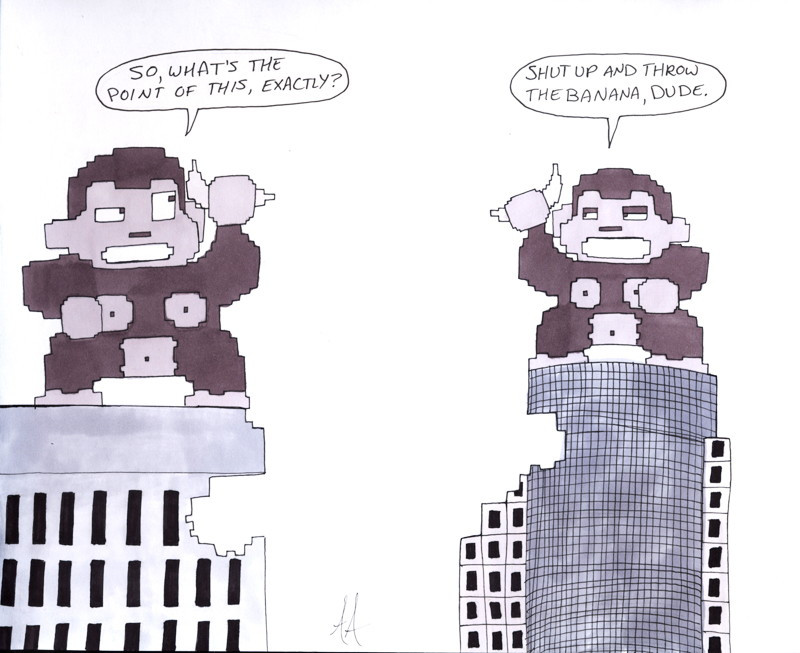On to the next level
Manitoba’s video game developers are pushing the local industry forward, with hopes of breaking it wide open
If there’s one thing you can say about Winnipeg, it’s no one trick pony. Since the turn of the century, the city has been a benchmark for diversity. Much of this is a result of our unwavering support for independent art and artists alike.
Our independent music, film and theatre scenes are worth boasting about, and are as large and vibrant as ever. Our independent game development industry is no laughing matter either.
That last sentence probably threw you off. “Wait, we have an independent game development scene?” We do indeed.
In fact, we have a rather secure gaming industry here that’s just about ready to shine.
“We’ve had so much growth in the past couple of years, and it’s only going to continue” said Noah Decter-Jackson, president of Complex Games and chair of the International Game Developer’s Association (IGDA) Winnipeg chapter.
“For a while we were the only ones who were trying to legitimately get into the gaming industry, but eventually we found a (game development) industry sort of sprung up here. We’ve now all converged to form the Independent Game Developer’s Association Winnipeg Chapter, and we’re discovering new developers every day.”
The IGDA is a non-profit organization with over 70 chapters worldwide. Their mission statement is: “To advance the careers and enhance the lives of game developers by connecting members with their peers, promoting professional development, and advocating on issues that affect the developer community.”
As the chairman of the Winnipeg chapter of the IGDA, Noah was integral in pushing the government to approve the Interactive Digital Media Tax Credit, which allows companies to gain a tax credit up to $500,000. This has helped raise the revenues of the local industry, which has nearly 800 employees, to more than $104 million annually.
“Manitoba’s game industry only a few years ago consisted of one or two studios labouring largely incognito with various levels of success to a nascent community of approximately 20 small studios,” said Ryan FitzGerald, the executive director of Fortune Cat Games Studio, Winnipeg’s premiere game development incubator.
“Most (developers) no longer have to rely on ‘day jobs’ to pay their mortgages or put food on the table. Compared to other industries, this kind of growth may not seem remarkable, but game development is a facet of the entertainment industry. In that vein, two dozen new jobs in such a saturated, Wild-West industry is a positive reflection of our people’s talent and Manitoba’s low barriers to entry.”
There is a lot of talent on display here in Manitoba.
Project Whitecard, a local industry leader, was given the opportunity to develop a training game for NASA to help astronauts prepare for missions in a massive multiplayer online game.
Infinite Ammo Games created Paper Moon, a unique two-dimensional platform with an intriguing art style, and Aquaria, the action/adventure/exploration game which won the IGF Grand Prize in 2007.
There’s also 13th Hour Studios, who just began testing their massive homegrown online multiplayer game Arrevan, a high-profile project that took them to the giant Game Developer’s Conference in San Fransisco earlier this year to rub shoulders with the industry elite.
Those are just a few examples of the many talented companies and individuals who are actively growing the industry here in Winnipeg.
The concept of video games as an important investment opportunity may sound strange to some, but nonetheless, it represents a huge financial opportunity for Manitoba.
“ We’ve had so much growth in the past couple of years, and it’s only going to continue.
Noah Decter-Jackson, chair of the International Game Developer’s Association (IGDA) Winnipeg chapter
“What’s the number one profession that kids coming out of high school want to do? It’s not film and not necessarily music; it’s game development,” Decter-Jackson said. “What happens if there’s no industry here? They are going to go to Vancouver, they are going to go to Toronto, wherever they perceive the industry will be. We have to work on improving the industry here to keep them here, to tap into this huge industry.”
Last year, the Digital Multimedia Program at Winnipeg’s Red River College (RRC) had 118 applicants. Unfortunately, RRC can only accept 40 students into the program per year.
“Roughly 85 per cent of those are high school students,” said Brian Fawkes, RRC’s digital multimedia program co-ordinator. “Many of them are exposed to video games and come into the program looking to do 3-D animation or programming, and quite a few succeed.”
Outside of Winnipeg, the world’s gaming industry is a behemoth. It is worth an estimated $14.4 billion CAD and employs over 80,000 people, with the average salary being a healthy $53,500 CAD.
Just a cursory glance at the staggering attendance numbers at game conventions gives insight into how popular the industry is. For example, the Penny Arcade Expedition, an annual convention for industry professionals and consumers alike, which is held in Washington state, sold 60,000 entrance tickets this past year.
The future is looking bright for the growing game sector here in Manitoba as well.
But how does a young student who wants to develop games get involved in the rapidly-expanding industry?
“Just make games,” said Decter-Jackson, with a smile. “Whether it’s for a professional company, or simply at home on your own computer with a few of your friends, you need to keep making the best games you can in order to get into game development.”
Published in Volume 64, Number 25 of The Uniter (April 1, 2010)







